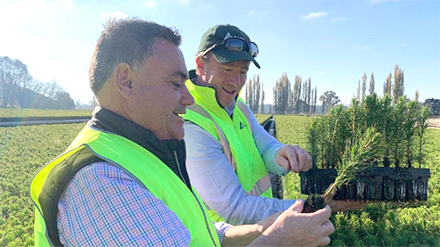
John Barilaro
The New South Wales Deputy Premier, John Barilaro, has vowed to return some of the reserved Red Gum forests in the Riverina back into commercial timber harvesting. In an address to the NSW Nationals’ state conference last month, Mr Barilaro, who is NSW Nationals leader, made a commitment to champion a motion to reopen the Murray Valley National Park for commercial logging. Source: Philip Hopkins for Timberbiz
If successful, the reintroduction of commercial red gum timber harvesting could inject $80 million into the district community and create more jobs.
The bill was previously tabled in Parliament by former Nationals Member for Murray Austin Evans, who lost the seat to the Shooters, Fishers and Farmers candidate Helen Dalton in the March election.
Mr Barilaro told the conference that the River Red Gums industry was wiped out with the stroke of a pen by former Premier Nathan Reece is his dying days as Premier by creating a national park based on Green policy.
“The only way to return this industry is to carve out the resource out of the national park. That is what we will do. The Liberals have not wanted to do this even though it’s the right thing to do,” he said.
“I will not sit by and see a community so unfairly dealt with lose their livelihoods forever, just because we don’t have a public debate with our partners. For that reason, the Nationals will reintroduce a bill after the winter recess and do what we were elected to do – convince the Parliament that this should be supported.
“If the fight is worth having, then we will have it – in the Cabinet room or public domain. Don’t take out vote for granted. You have no right to trade away regional NSW.”
Mr Barilaro said he was prepared to relinquish the title of Deputy Premier if he could not speak more for the bush.
“The title means I am subservient to the leader of another party – it’s difficult to assert our brand as stand-alone party in this state,” he said.
The push to reopen the red gum industry came on 15 November last year when Mr Evans introduced the National Parks and Wildlife Legislation Amendment (Riverina) Bill 2018 to the Legislative Assembly.
Mr Evans said the original bill creating the reservations was passed in the Legislative Council on 20 May 2010. The hasty passing of the bill, reintroduced in amended form and passed by the Lower House fewer than 12 hours earlier, ended an almost 150-year industry in the Riverina red gum forest. That industry had contributed $164 million per year to the local economy and was the source of 550 direct and indirect local jobs.
“The rapid passage of the bill was to allow Labor to cancel forestry operations in the red gum forests before the NSW State election on 26 March 2011, thereby securing a preference deal with the Greens,” he said.
More than 100,000 hectares of forest was transferred to the national park estate, and forestry operations ceased. The Institute of Foresters said at the time that taxpayers through the Government were paying $97 million to close a vibrant and sustainable industry.
“This is why the Riverina feels so much anger, hurt and betrayal,” Mr Evans said. No report ever suggested that forestry was the cause of the decline in forest health – it was the lack of water from drought, particularly the millennium drought, the worst in recorded NSW history.
“Since the original report, the forest has flooded several times … and the ecology of the forest has stabilised…We shut down an entire industry … for no reason,” he said.
Mr Evans said Labor’s act converted 45 State forests into nine national parks.
“The bill will repeal the Murray Valley National Park and the Murray Valley Regional Park and restore the forests as State forests – 24 in total,” he said.
“The bill is not an attack on national parks…While national parks are highly vested in preservation, State Forests can be managed for many purposes – sustainable timber harvesting, recreation, grazing, wildlife, fishing and more.”
Mr Evans said the revocation of the bill would bring back human activity that would coexist with native flora and fauna as it did for 150 years and thousands of years before that through Aboriginal participation.
“It will allow for the reinvigoration of the timber industry in the area and provide a significant economic boost to towns such as Deniliquin, Mathoura, Moama and Barham,” he said. “This bill is of the utmost importance to my constituents…For eight years they have faced significant economic hardship.”
Mr Evans said the promised tourism jobs had not occurred. “Local tourism figures actually show a fall of 30 per cent since the forest were locked up,” he said.





